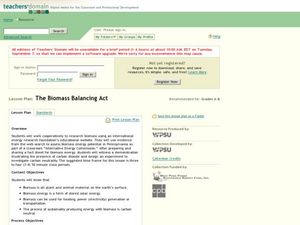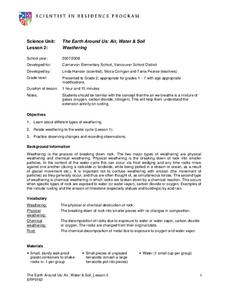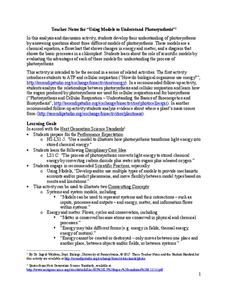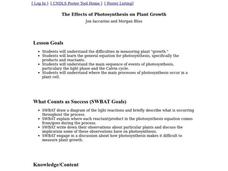Chicago Botanic Garden
Carbon, Greenhouse Gases, and Climate
Climate models mathematically represent the interactions of the atmosphere, oceans, land, sun, surface, and ice. Part two in the series of four lessons looks at the role greenhouse gases play in keeping Earth warm and has participants...
Curated OER
Losing An Island
Students examine carbon dioxide and determine the impact of greenhouse gases on the earths spheres. In this pollution lesson students complete a lab activity to see the impact of gases on the environment,
Curated OER
Mussel Your Way Through Photosynthesis
Pupils, using zebra mussels (Dreissena polymorpha), elodea and an indicator dye, observe and record the role of light in photosynthesis. They consider plant production of carbon dioxide and the use of live materials in biological research.
Curated OER
The Biomass Balancing Act
Students work in groups to research biomass using the International Energy Agency's website. Students use evidence from the web search to assess biomass energy potential in Pennsylvania as part of a classroom "Alternative Energy...
Curated OER
Changing Planet: Fading Corals
Show the six-minute video, "Changing Planet: Fading Corals," and then demonstrate how calcium carbonate forms a precipitate in the presence of carbon dioxide. Separate your scientists into small groups to gather information about coral...
Curated OER
How Cells Harvest Energy
Survey the metabolism process from respiration through the production of the ATP molecule with this seven page AP biology worksheet. Pupils write short answers on the lines provided and label a diagram of the cellular respiration process.
Curated OER
Where in the World is Carbon Dixoide?
Students conduct experiments designed to detect the presence of CO2 by using a BTB that changes color (blue to yellow) in the presence of CO2. First, students experiment with the CO2 from combining vinegar and baking soda. In part two,...
Curated OER
Weathering
Second graders explore weathering and how the water cycle plays a part in weathering. In this weathering lesson, 2nd graders put gravel and sugar cubes in a jar and shake, simulating weathering. Students use the scientific method to do...
Curated OER
Plant Transpiration
Students conduct various experiments to investigate plant transpiration. In this biology instructional activity, students explain how this process helps maintain the hydrologic cycle. They measure the rate of water loss in plants using a...
Curated OER
Travel Solutions to Global Warming
Students research and investigate the concepts carbon cycle and fossil fuels. They graph the carbon dioxide production as well as populations of six nations. Together they generate a variety of recommendations to reduce travel=related...
Curated OER
The Biomass Balancing Act
Students conduct research and prepare and share a fact sheet for biomass energy. They witness a demonstration illustrating the presence of carbon dioxide and design an experiment to investigate carbon neutrality.
Curated OER
The Cricket and The Plant
Students examine determine the symbiotic relationship between plants and animals as the find ways to naturally reduce carbon dioxide emissions. They study the carbon cycle. They work with probe and graphing calculator to examine the...
Chicago Botanic Garden
Historical Climate Cycles
What better way to make predictions about future weather and climate patterns than with actual climate data from the past? Young climatologists analyze data from 400,000 to 10,000 years ago to determine if climate has changed over time....
Serendip
Using Models to Understand Photosynthesis
Is your class in the dark about photosynthesis? Shed some sunlight on an important biological process with a thoughtful activity. After answering questions to help determine their level of knowledge, learners work with chemical equations...
Curated OER
Cellular Respiration and Photosynthesis
In this cellular respiration and photosynthesis worksheet, students read through the presented material and draw an illustration of the production of ATP. Students answer several short answer questions about the production of ATP,...
Curated OER
Nitrogen Cycle
Students identify the main concepts and ideas of the nitrogen cycle.
They review key concepts covered up to this point in ecology including food chains, food webs, energy pyramids, and bio-geochemical cycles.
Curated OER
How Does Your Plant Grow?
Students measure and record their height in centimeters on a graph. By integrating math and science, students collect data and apply graphing skills to the experiences they are having growing plants. Finally, students identify how to...
Curated OER
The Effects of Photosynthesis on Plant Growth
High schoolers are able to draw a diagram of the light reactions and briefly describe what is occurring throughout the process. They are able to explain where each reactant/product in the photosynthesis equation comes from/goes during...
Curated OER
AP: Chapter 9A: Respiration - Glycolysis
AP biologists aspire to respire with this worksheet. In it, they write short answers to 26 questions about cellular respiration. Topics addressed include the Kreb's cycle, fermentation, and more. Written as a chapter reading...
America's Blood Centers
My Blood, Your Blood
Dracula isn't the only one who needs blood to survive. The eight-part unit includes seven lessons, five demonstrations, seven labs, and a project to organize a blood drive. Class members learn about the parts of blood, the form and...
It's About Time
Volcanos and the Atmosphere
In the summer of 1815, snow fell every month in New England. Was this related to the volcanic eruption of Tambora in Indonesia earlier in the year? Young scientists design their own experiments to research the long-term effect a volcanic...
Serendip
Photosynthesis and Cellular Respiration
How does energy from the sun make plants grow? Scholars move step by step through the processes that promote plant propagation during a detailed lesson. The resource illustrates ADP production and hydrolysis, then allows learners to...
Curated OER
Science: What Is the Carbon Cycle?
Students examine the carbon cycle while identifying its sources, sinks, and release agents. Using magazines and newspapers, groups of students design collages illustrating the carbon cycle. Finally, they write responses to several...
Curated OER
Terrestrial Sequestration - Photosynthesis and Cellular Respiration
Students investigate how plants absorb carbon dioxide during photosynthesis. In this biology lesson, students differentiate photosynthesis and cellular respiration. They discuss the important role of plants in the environment.

























